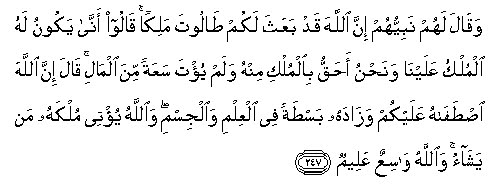In the Name of Allah, the Gracious, the
Merciful
After the death of Prophet Moses (peace on him), Allah Almighty continued
to send other Prophets to the Children of Israel for their guidance. The
extract below from QUR’AANIC
STUDIES – A Modern Tafsir PART I is related to one such Prophet. The
Children of Israel (Jews) had asked him to get a divinely appointed King for
them.
247. Waqala lahum nabiyyuhum inna
Allaha qad baAAatha lakum taloota malikan qaloo anna
yakoonu lahu almulku AAalayna wanahnu ahaqqu
bialmulki minhu walam yu/ta saAAatan mina almali qala inna Allaha istafahu
AAalaykum wazadahu bastatan fee alAAilmi waaljismi waAllahu yu/tee mulkahu man
yashao waAllahu wasiAAun AAaleemun
2:247. And their
Prophet informed them, "Allah has decreed Tuaaloot to be king for you!"
They said, "How could he get precedence over us in getting the kingdom,
when we were the ones more deserving? And neither is he endowed with abundance
in wealth!" The Prophet said, "Allah has chosen him over you; and has
given him much more knowledge and physical strength.467, 468 And
Allah grants dominion over His land to anyone He wishes. And Allah is
All-encompassing, Wise!"469
467.
Tualoot was a divinely chosen king. He was divinely appointed on the request of
the people (Verse 246 above). Once such appointment was made, there was no
question of the people questioning that appointment. But the Chiefs of the Children
of Israel did question the propriety of the divine appointment because of
their own satanic pride.
468. In today's world, however, there
can't be such direct, obviously divine appointments. Allah had made the above
such appointment through one of His prophets. But Allah has ended prophethood
with Prophet Muhammad, peace and Allah's blessings be upon him. What then is
Allah's guidance for us now, in the matter of governance of a country? In Verse
42:38, Allah appreciates those who conduct their affairs by mutual
consultations. And therein lies the divine guidance. We must conduct our public
affairs by mutual consultations. In the case dealt with in these Qur'aanic
Verses, the choice of Tuaaloot gives us the further guidance that there ought
to be an executive head of state. The head of state must be chosen based on his
abilities, and not because he belongs to a ruling dynasty or class. It is thus
clear that Islam does not favour a dynastic rule. And, in view of Verse 42:38
quoted above, the chosen head of state cannot work autocratically, but by
mutual consultations with an advisory council. In an Islamic state, the Qur'aan
must be the Constitution; and the subsidiary rules for implementing the
Constitution must be framed by a legislative body consisting of persons chosen
by the people. The USA pattern appears to be in line with Islamic requirement,
except of course for the Constitution.
469. Even though, in today's world, the
rulers are generally chosen by the people, it is a fundamental Islamic faith
that no one can become a ruler – nor, for that matter, anything happen in this
world – against Allah's Will.
Friday,
the 6th of September 2019.

No comments:
Post a Comment